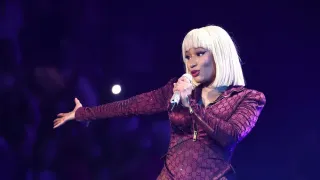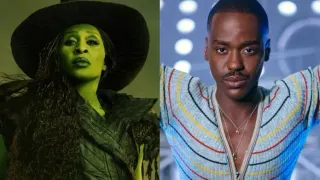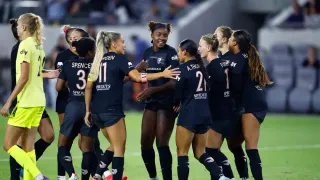
9 hours ago
Kelly Clarkson’s Mic Drop Moment: The Pop Icon’s Clapback Against Body-Shaming in the Industry
READ TIME: 4 MIN.
It’s late, the spotlights are blazing, and Kelly Clarkson is mid-set at her Las Vegas residency—when she makes a sudden, unscripted confession. Adjusting her top and slyly checking for a wardrobe malfunction, Clarkson leans into the mic and drops a truth bomb that ricochets far beyond the neon of the Strip: “I had some manager one time told me to get a boob job and I was like, ‘Why don’t you get a job?’ I was like, ‘I’m fine with my titties. Get out of here.’”
For anyone who’s ever felt “not enough” in a world of airbrushed expectations, Clarkson’s clapback isn’t just witty—it’s revolutionary. The industry’s obsession with surgically honed bodies isn’t new; it’s a decades-old script that’s been weaponized against women, queer people, and anyone who doesn’t fit the cis-heteronormative mold. Clarkson’s refusal to play along—delivered with a classic dose of Texas charm and unsinkable humor—echoes the kind of self-acceptance that’s at the heart of queer resistance.
“I just was like, who says that? People say that. They say it all the time to people in the industry. They say the craziest. I’m like, this is not normal,” Clarkson told the crowd, her voice equal parts disbelief and defiance . In a single sentence, she managed to drag the entire toxic machinery that polices bodies, identities, and self-worth—from pop stages to boardrooms, and everywhere in between.
Clarkson’s off-the-cuff honesty lands with particular resonance for queer and trans fans who have spent lifetimes battling prescriptive ideals about what bodies “should” look like. The queer community knows all too well how beauty standards can be used as blunt-force tools of exclusion, especially for those whose gender expressions or bodies don’t map onto mainstream expectations. For transgender people, nonbinary folks, and anyone who lives outside the gender binary, the pressure to “fix,” “enhance,” or “correct” oneself is both personal and political.
That’s why Clarkson’s refusal to comply feels so deliciously subversive. It recalls the radical self-love movements that have flourished in queer spaces: zine collectives, ballroom scenes, drag stages, and TikTok feeds where “unapologetic” isn’t just an adjective—it’s a survival strategy. Her retort, “I’m fine with my titties,” could just as easily have been uttered at any Pride afterparty, Vogue Ball, or trans visibility march.
Clarkson’s story exposes a broader truth: The entertainment industry’s fixation on “fixing” bodies is as much about control as it is about aesthetics. For queer and trans artists, this scrutiny can be doubly intense. The message is clear—conform or be sidelined. Yet, every act of defiance, every public figure who shrugs off those demands, chips away at the monolith of “acceptable” beauty.
This is not just about breasts or waistlines; it’s about agency. The right to decide how (or whether) to modify your body is central to queer liberation, bodily autonomy, and self-definition. For many LGBTQ+ people, especially trans and nonbinary individuals, that decision-making process is fraught with gatekeeping and judgment—from both outside and even within the community. Clarkson’s “get a job” punchline is more than a joke; it’s a blueprint for pushing back against intrusive, uninvited commentary.
Clarkson’s moment arrives at a time when conversations about body positivity and inclusivity are finally breaking into the mainstream—often led by queer voices and artists. Whether it’s Lil Nas X dismantling masculinity one music video at a time, or Lizzo turning up the volume on self-love, there’s an unmistakable throughline: The future of pop culture is queer, inclusive, and unbothered by the gaze of outdated gatekeepers.
But make no mistake, the pressure remains. As Clarkson herself notes, “They say it all the time to people in the industry. They say the craziest…” . The difference now? More artists are speaking out, and more fans—especially queer fans—are listening, reposting, and amplifying those moments of truth.
Clarkson’s onstage candor comes during her first Vegas residency dates following the death of her ex-husband, Brandon Blackstock, in August—a period she described as deeply challenging, particularly for her children . “While I normally keep my personal life private, this past year, my children’s father has been ill, and at this moment, I need to be fully present for them,” she wrote to fans. By choosing to show up for her residency—and to be raw and real onstage—Clarkson demonstrates a kind of vulnerability that’s almost always coded as “feminine” and, by extension, devalued. For queer people, who are often forced to compartmentalize pain and put on a brave face, her willingness to be both tough and tender is its own brand of strength.
Kelly Clarkson’s refusal to let a manager’s sexist, body-shaming directive define her is a reminder that no one—not a pop svengali, not an anonymous online troll, not even well-meaning family—gets to dictate how we inhabit our bodies or our identities. The LGBTQ+ community, long familiar with the costs (and triumphs) of self-acceptance, finds a kindred spirit in Clarkson’s refusal to shrink, smooth, or surgically edit herself for someone else’s comfort.
So let’s give credit where it’s due: Clarkson’s Vegas mic-drop isn’t just a celebrity anecdote—it’s a call to arms for anyone who’s ever been told to change. Whether you’re a pop star, a drag queen, a nonbinary icon in training, or just someone learning to love what you see in the mirror—this moment is for you.
Shout it with us: “I’m fine with my titties. Get out of here.”






